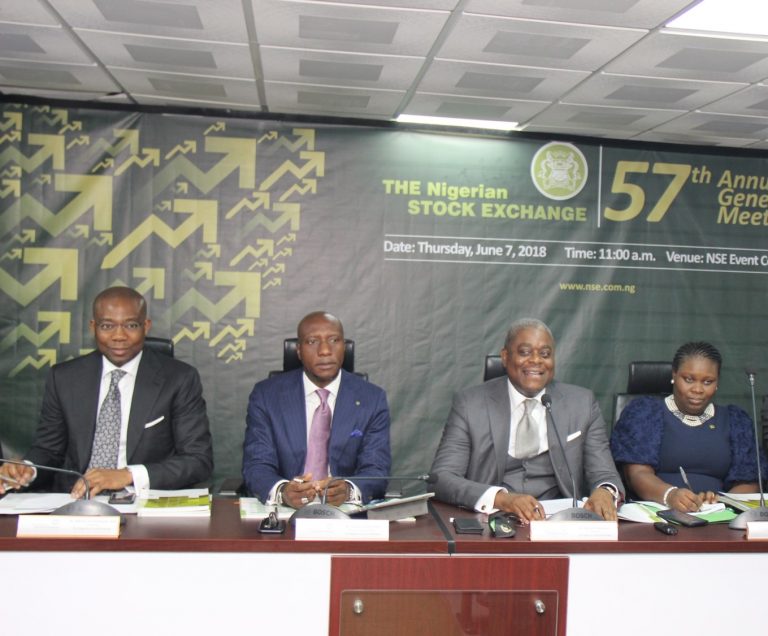Photo Caption: From left, Aigboje Aig-Imoukhuede, Ex-Officio, National Council, The Nigerian Stock Exchange (NSE); Oscar Onyema, Chief Executive Officer, NSE; Abimbola Ogunbanjo, President, National Council, NSE and Mrs Mojisola Adeola, Head, Council Secretariat, NSE, during the 57th Annual General Meeting of the Exchange held on Thursday, June 7, 2018, at the NSE Event Centre in Lagos.
The Nigerian Stock Exchange (NSE) on Thursday presented its audited financials for the year ended December 31, 2017, which showed a strong return to surplus position, after previous year’s slump arising from the nation’s slippage unto the height of a recession, with the market depressed for the third consecutive year.
While revenue jumped by N5.316bn, or 129.76%, to N5.872bn from N2.555bn the highest since 2015 when the market started a decline; added to other income that grew from N1.902bn in 2016 to N2.431bn, representing a 27.81% rise.
Impairment loss on financial and non-financial assets dropped to N49.574m, compared to N156.412m in prior year.
Personnel expenses increased slightly to N2.866bn from N2.655bn; while operating expenses rose by N368m or 18.81%; resulting in net operating expenses of N2.808bn, which was marginally lower than the N2.865bn reported in 2016.
Operating surplus stood at N2.548bn, compared to the prior year’s N802.772m deficit, while the NSE’s share of profit of equity accounted investees (net of income tax) climbed to N1.267bn, which was N397.892m or 45.76%.
Operating surplus before tax therefore increased to N3.815bn from just N66.6m; just as income tax expenses for the period dropped to N23.536m from N39.148m; leaving operating surplus after tax at N3.791bn, up from N27.452m.
Meanwhile, a total of 100.522bn units where traded between January and December 2017, worth N1.272tr in 947,088 deals.
While volume peaked in November at 21.488bn shares, or 21.37% in 75.427 deals; followed by the 10.503bn units in 118,716 deals; and the 8.722bn shares exchanged in December in 81,247 deals. In value terms, December was the biggest contributor with N240.861bn, or 18.92%; followed by the N198.461bn, or 15.59% recorded in August; while March accounted for N142.557bn, representing 11.2% of the total transaction value for the year.
Commenting on the performance, Abimbola Ogunbanjo linked the 80% surge in the NSE’s top line to recovery of the domestic and global economy in the second half of the period under review. Riding on this wave, he noted that the exchange delivered the highest operating surpluses in the last five years.
“Our net assets grew by 19.3% to N23.1Bn providing us greater financial flexibility to execute our strategic agenda and respond to changes in our operating environment,” he added.
Also commenting, Oscar Onyema, chief executive of the NSE said the “financial performance of the NSE bears testament to the vastly improved operating environment of 2017.”
Growth in total income, according to him, “was mainly driven by a rejuvenation in trading activity following the introduction of the market-based foreign exchange regime in April 2017.
“Buoyed by improved ease of market entry and exit for foreign portfolio investors, transaction fees jumped 130% year-on-year to N3.6bn, accounting for 45% of the Group’s total income in 2017. Similarly, listing fees appreciated by 110% compared to 2016 indicating a revival in primary market activity from the lacklustre performance of the previous year,” he added, noting that there was emphasis on diversifying the exchange’s income streams.
“I am pleased by the positive results we have recorded in this regard. Our market services business consisting of technology and market data services continue to perform impressively.
“More telling is the fact that market services income has continued to grow despite the market down-cycle which significantly impacted our core trading and listing businesses in 2015 and 2016. In recognition of this, we will continue to invest heavily in developing our market services portfolio and providing innovative products and services that are less correlated with market cycles and, more importantly, global oil prices.”
Onyema also drew attention to the Exchange’s new 2018-2021 Strategic Plan, which he described as “a dynamic framework to deliver the NSE’s mission, with opportunities for all our stakeholders to flourish. Our reinvigorated approach to meeting the needs of our diverse customers is reflected in our new vision of ‘Africa’s preferred exchange hub’. The new vision, he continued, seeks to “Create value for investors and businesses in Africa, and beyond; be the preferred market for the end-to-end customer experience; and become a fully integrated, multi-asset class exchange hub with diversified revenue streams.”
To achieve this, he said four pillars of growth: operational efficiency, customer-centricity, innovation and partnerships. Towards operational efficiency, the Exchange will be focused optimizing internal operations in order to deliver greater value to our customers have been identified.
The outcomes in this area are expected to drive ability to reinvent the customer experience for investors, issuers, intermediaries and wider stakeholders.







